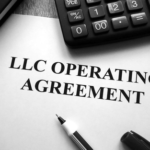We have helped many people form, organize, and operate limited liability companies (“LLCs”). For people that are new to running an LLC, sometimes the terminology can be a challenge. Listed below are some basic terms to help you get started.
North Dakota Century Code
North Dakota’s statutes, called the North Dakota Century Code (“Century Code”), has a series of default and mandatory rules concerning the operating of a limited liability company (specifically, the Uniform Limited Liability Company Act). The Century Code gives people the ability to form limited liability companies by submitting articles of organization to the North Dakota Secretary of State.
Articles Of Organization
The articles of organization are filed with the North Dakota Secretary of State, and their office keeps records related to LLCs. This is your company’s charter document. This means it supersedes any other document you create related to the LLC (it does not supersede the Century Code, though). Think of the Articles of Organization as your company’s constitution. This is a public document and takes a process to amend, so usually, it is very short.
Operating Agreement
The operating agreement is an agreement between members. It dictates how the LLC makes decisions, how it gives authority to its manager or managers, how it files taxes, and how it handles disputes between members. Often, the operating agreement will contain what’s commonly called a “buy/sell agreement.” A buy/sell agreement is an agreement between the members regarding what happens if a member dies, becomes disabled, gets divorced, goes bankrupt, or gets fired. The operating agreement is the company’s second most important document.
Minutes
Minutes refer to meeting minutes. In order for your company to operate, it needs to take corporate action (often referred to as a corporate resolution). In order for your company to take corporate action, a decision needs to be made by its constituents. For limited liability companies, this means the members need to make those decisions. The minutes are the memorialization of decisions made by members (or its board of governors). Minutes are placed in a minute book for future use.
Written Action
An LLC can make decisions without meetings. These are referred to as a written action in lieu of a special meeting or a written action in lieu of an organizational meeting. A written action memorializes the decision, and the members (or its board of governors).
Managers
Sometimes an LLC does not need to have a meeting in order to make a decision. An LLC’s manager may have the discretion to make the decision without going through corporate formalities. The extent of a manager’s discretion depends on the Century Code, Articles of Organization, Operating Agreement, and Minutes/Written action.
Contact Us
This article is for information purposes only and is not legal advice. If you have questions regarding corporate action, please call our Business Law Team at 701-297-2890 or send us an email below.










